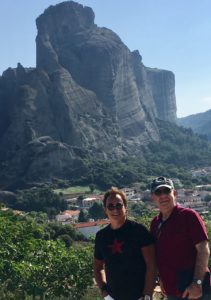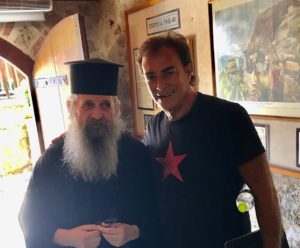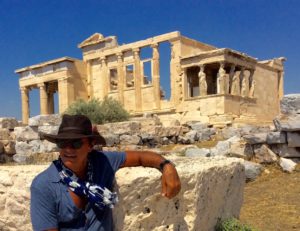How DAYS’s Thaao Penghlis (Tony) learned the concept of “the arrogance of a loser” during a trip to Greece.
When I left my home on a journey to Europe, I knew that when I returned through that same door, something about me would have changed. I discovered that crossing large bodies of water was the best way to objectively see where life has taken you so far. Being at a distance helps reveal what you cannot see developing inside the womb within your own walls. I believe that when a transformation is taking place, this practice demands willpower. If you allow your thoughts to flow without adjustment, you can easily spin into areas you’d prefer to avoid, especially when dealing with other people’s unrealized junk.
What came to mind was an incident that took place a few years ago when a veteran actor in a Saturday morning workshop completed a chosen scene to slight applause. As he sat at the edge of the stage, he began expressing — with an attitude — the reasons behind the choices he made that ended up failing his dramatic piece. The room fell silent. Our teacher, Milton, just stared back at the actor but after assessing the thespian’s remarks, without even a blink he simply responded, “You have the arrogance of a loser.”
The actor was stunned, so was the class.
What did it mean?
The answer seemed to have gone missing. Seeing the actor’s ego surface in defense made me realize that he wasn’t ready for change. Sometimes when things raise their ugly might, you may think you understand the “meaning”, but not until you’ve experienced it emotionally does its profoundness become clear. After all, the remark wasn’t exactly an overnight cognition for the actor or for the class. He became despondent. The pain was suppressed, as he was in denial. The meaning was there within his grasp but the teacher knew the discovery would be made only when he was ready. In the meantime, the arguments within the class were many. But this teacher always made sure that he had the last word. He would never allow himself to be upstaged by anyone. It was an interesting game, a “power game”, well played and worth being in the presence of our dear mentor, Milton Katselas. We may leave a class feeling like a failure but we were taught never to waste those unresolved emotions, but to put those feelings through the words of your next scene. Remembering those days were magical experiences, coming out of difficult times, seeing clearly the passage you just lived through, guided by the tools of intuition that developed through the years of training with your mentor guiding you.
The loser would hold onto that criticism, the winner came back with a vengeance. We had to learn how to be survivors. If you couldn’t take the criticisms in class, how would you survive the Hollywood machine?
After all, Milton was Greek and in my world, I loved and hated my Greek ancestry. It was that arrogance that was never attractive to me. But then when I grew up, I found that I had it, too. But having lived outside of Greece, the British education from Australia, England and the United States rewarded us with a discipline, a work ethic, to be able to move that false arrogance away when it was time to reveal what lay beneath that fear.
It’s when they tried to hide behind it that the loser revealed his hidden face.
Knowledge was gained through you, not from you.
The loser, the arrogance of a loser, I discovered, lacks gratitude. Like a black hole, it absorbs everything it can but is never satisfied. God forbid it gives something back. Somehow it remained with me through the years, the lack of gratitude in people’s lives.
A new journey was about to begin.
But before I started on this new path, I began to see with clarity what I had accumulated up to this stage of my life. It was pulling me in many directions while the years seemed to be moving faster as I got older. Now I had to decide, which way to go? I needed to be amongst the ruins where a simple column could stir my imagination and reveal to me another imaginary tale. Ancient places like monasteries did that for me, where secret knowledge remained within its walls waiting to be discovered, while centuries of burnt out candles permeated the air.
New truths emerge when your basic values are in transition. What applied yesterday is no longer true today. I found ways to replenish my energy by only spending time with those who supported my personal growth, and I theirs. But alas, not all old friends change; arrogance again was to follow me on this next path.
Old ways don’t open new doors.
It surfaced during my journey to Meteora, the second most important monastic life in Greece after Mount Athos, which is situated on one of three peninsulas in Northern Greece jutting out into the Aegean. But nothing can compare to the stunning landscape of ancient Meteora.
I met my friend of many years, Greek journalist Mario Focas, who lived in Athens. We traveled to many places and he would write about the story for his newspaper. Most of the time we had fun, but he never failed once to lose his dramatic temper. It always remained unpredictable, the screaming and unjustified accusations. In the soap opera world, it would have been regarded as over-the-top.

Penghlis & Mario Focas
I thought, “How do I resolve this one?”
But let me go to the beginning of that wonderful day before that noise reared its ugly head. After having traveled six hours the previous day from Athens, I couldn’t wait to explore the solitude life of a monk and sit within its monastic walls that hermits have called home since the 10th century. Upon arriving in the town called Kalambaka that lies beneath this stone forest, I was taken aback by its beauty. It was awe-inspiring.
Meteora is a unique physical phenomenon, created by millions of years of extreme weather, and by floods that created rivers rushing through its landscape, appearing like deep wounds from the battle against the tremendous forces of nature.
Mario and I climbed to the top of one of the monasteries, lit candles and said a prayer. The icons from the 13th century were magnificent. As we were sitting there, an aged monk came by and paused. He was curious from where we came and he was pleased when we spoke to him in Greek. Such simplicity was his nature. After a short while I asked him, “How difficult is the life of a monk?” He replied, “The life that I live is not very difficult. To raise a family, have a wife and children is difficult because you have to watch arguing with your wife and children and be a good man, because here for me, I am alone, I don’t have any problems. It’s easy to be a good man here, to have enlightenment when you remain in solitude. I don’t have any concerns or distractions. I don’t have any problems, but to be where you are in a big city like New York and find enlightenment there, that’s difficult. It’s easier here, so I wouldn’t describe my life as being difficult. But you have to find enlightenment within chaos. That’s a big struggle. Here we mostly live in quietness where you can think clearly without distractions.” I thought, “How profound was that? Thank God for curiosity.”

We went out to the church’s balcony and found such a breathtaking view. Those thick grey/black rocks stood silent like monks, while even those stones seemed to breathe prayers.
That evening we went to our hotel rooms to clean up for dinner. It was a thankful day being away from the chaos that filtered our lives. Feeling rewarded, I went down to the restaurant to meet my old friend, thinking after that day’s experience God was with us. He was drinking coffee at the café when I suggested it was late and we should go down the street for dinner. Suddenly, there was a burst of anger accusing me that we only do what I want and because of my ego that comes from living in Hollywood I don’t ever consider want he wants. I think he resented me taking care of the expenses, as journalists hadn’t been paid since February due to Greece’s financial crisis. He stormed off with such arrogance; I then realized it happened every time I visited him in Greece. He would always create an altercation.
I finally understood his behavior exuded the arrogance of a loser.
We have never spoken again since last year. Sometimes we need to move on, even after 30 years of friendship, over such petty matters. We drove back in silence. I kept thinking what the monk said, “Finding enlightenment in chaos,” and his truth comforted me.
Before leaving Greece, I climbed to the top of the Acropolis. While sitting by the ruins of the Parthenon that lie on top of the crown of Athens, I thought about my two characters that I had been playing for 38 years on DAYS OF OUR LIVES, Andre and Tony.
What separated them?
I had always played Tony as the perfect son of Stefano DiMera, always pulled together with a hint of being diabolical. Andre, who popped up on the screen a year later, was an impostor trying to be Tony so that Father would love him, as well. But he turned out to be a failure who committed many crimes. As the years went on, different head writers made both characters similar, which sometimes made it difficult to interpret. Even after they died many times, some confusion set in, especially when James Reilly was head writer. Andre began being an arrogant loser.
Sitting by an ancient column, I had a cognition about this subject. One day, I had wanted to make Andre less of a loser and more of a man who found his heart. And that element arose when I was doing a scene with his brother’s wife, Abigail. For the first time, I took the dialogue of that scene and interpreted it through the character’s heart. It really wasn’t written that way, but I think it caught the ear of our head writer, Ron Carlivati. I had played Andre’s insecurities with arrogance and interpreted him like a loser.

Showing Andre with a heart brought about his death. As the story continued, I understood with Abigail’s insanity she killed the one friend she loved, Andre. In the story that followed in regaining her sanity, that accidental death gave her the most pain. A brilliant episode followed, expressing that in a black-and-white segment. By giving my character heart, it proved to be his demise. But when I walked back through that same door in Los Angeles, the change that took place was an Emmy nomination for that black-and-white episode.
I finally understood what the arrogance of a loser meant. I heard it first from Milton Katselas, and enriching a character’s life that was always played like a loser took the arrogance of insecurity away and made him whole. Even at his expense.
Life continues.







